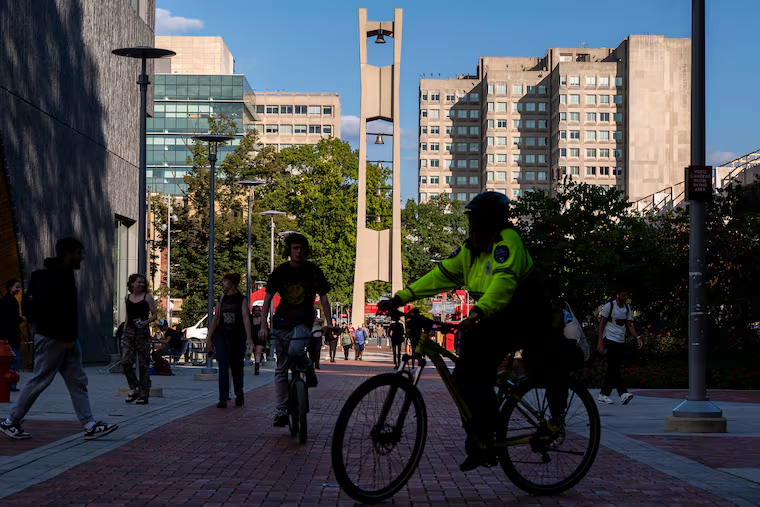Temple aid to help make tuition free for low-income Philadelphia families
Freshmen entering in fall 2024 would be the first eligible for the new aid plan.

Temple University on Thursday announced a new program that will make tuition and fees free for first-time, full-time college students from low-income families who live in the city of Philadelphia.
The Temple Promise program would cover costs for students whose families’ adjusted gross income is $65,000 or less and be applied after all other federal, state and scholarship aid is tallied. The new program comes in addition to Temple’s Cecil B. Moore Scholars program, which awards scholarships that cover full tuition at Temple for public school students in eight zip codes in its North Philadelphia neighborhood.
» READ MORE: Gov. Josh Shapiro proposes sweeping reform of Pa. state-funded higher education
And it comes just days before Gov. Josh Shapiro is expected to announce details of his new plan for higher education, which includes a proposal that would cap tuition at $1,000 per semester at state-owned universities and community colleges for students who come from families making $70,000 or less. (Temple, as a state-related university, is not part of that group.) Shapiro’s plan also would increase Pennsylvania Higher Education Assistance Agency grants by $1,000 for all students attending state-related universities, including Temple, and independent colleges.
Temple president Richard M. Englert said the governor’s effort and Temple’s “were independent, parallel activities and processes.”
But, he added: “There is no doubt this is very much aligned with the basic concepts behind Gov. Shapiro’s blueprint, a focus on access, a focus on affordability, economic development, social mobility, things that are in our DNA.”
Freshmen who meet Temple’s admission criteria and enter in fall 2024 would be the first students eligible for Temple’s new aid plan, and would keep the aid in subsequent years as long as they continued to qualify. Current Temple students would not qualify for the program.
“Higher education, at its best, serves as an economic driver and engine of social mobility,” Englert said. “Temple Promise will be transformational for both the university and the city by providing more students with an affordable path to a college degree and reducing the burden of debt.”
» READ MORE: After a tumultuous year, Temple ranks in top 100 in revamped U.S. News rankings. Here’s a closer look.
The cost of the program
Temple, where in-state students this year pay a base tuition and fees of $18,947, estimates it will have to cover about $6,800 per student. The maximum federal Pell grant for low-income students is $7,395 and the maximum state grant is $5,750.
The university is budgeting $11.3 million for the effort in the first year, but that investment will grow over time, the school said.
About 670 of the 3,800 students in Temple’s most recent freshman class — or nearly 18% — reside in the city of Philadelphia. University officials expect that number to grow with the rollout of the new program, given that cost is a significant barrier for students from low-income families to get to and through college.
“We’re certainly expecting that this will result in several hundreds more students coming to Temple who otherwise wouldn’t have been able to financially make ends meet, and it certainly might go north from there,” said Gregory Mandel, provost.
Overall, the university’s most recently admitted class includes more than 1,450 Pell grant recipients and 39% first-generation college students, the university said.
» READ MORE: We surveyed 20 local universities about enrollment. Here’s what they’re seeing.
The plan follows a multiyear enrollment decline at Temple. This year, the university enrolls 30,530 undergraduate, graduate, and professional students, down 9.2% from last year and 22% from 2019. The university raised tuition by 4% this year for Pennsylvania and out-of-state residents.
» READ MORE: Temple raises tuition more than 4% for Pennsylvania and out-of-state residents
Mandel said applications this year, including those from international students, are significantly up from last year.
Jose Aviles, Temple’s vice provost for enrollment management, said Temple looked at other promise programs across the country targeted at low-income and first-generation students, many that are state funded. In New Jersey, residents who attend in-state, public, four-year colleges and have an annual adjusted gross income of $65,000 or below do not pay tuition and fees during their third and fourth years of college.
Temple is funding its own program, Aviles said.
In line with Mayor Parker’s vision
Temple noted its program also is meant to respond to Philadelphia Mayor Cherelle L. Parker’s call for efforts designed to reduce poverty and improve conditions for families.
“Temple University’s commitment to the Temple Promise, which provides vital financial aid to talented Philadelphia students, aligns with our 100-Day Action Plan for the Parker administration, which envisions close collaboration with our region’s universities, to establish an equitable, thriving educational system that empowers students across our city,” Parker said in a statement, provided by Temple.
Shapiro and Philadelphia Superintendent Tony B. Watlington Sr. also applauded the effort.
“Costs can be a barrier for students to attend college, so providing students with free access to high-quality, post-secondary education can be a game changer for our students and their families,” Watlington said in a statement.